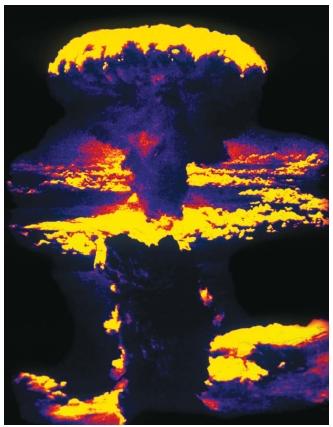Israeli strikes, North Korean nukes, and conjecture of selective leaks

Journalists need to heed the con in conjecture and be a bit skeptical about rumours and anonymous leaks, backed up by notable cherry-pickers like John Bolton, the neo-con former US ambassador to the United Nations. The BBC diplomatic correspondent, Jonathan Marcus, examines the fallout after the mysterious Israeli incursion into Syrian airspace two weeks ago. Tel Aviv still maintains its official silence while the regional wardrums are throbbing. Condi Rice arrives at noon.
Nearly two weeks on from Israel's incursion into Syrian airspace, the mystery surrounding the operation shows little sign of disappearing.
Press reports suggest strongly that the Israeli jets destroyed a facility near Syria's border with Turkey.
All sorts of details of the operation have "leaked" out, but still the precise nature of the "target" remains unclear.
By far the strongest theory though suggests a North Korean nuclear connection - a linkage which the North Korean authorities have strenuously denied.
The story put about by largely unnamed US sources and backed up by the former US ambassador to the United Nations, John Bolton, is that North Korea - under international pressure to scale down its own nuclear weapons programme - has recently transferred equipment or technology to Syria.
And it is this equipment - possibly at a fledgling research centre - that the Israelis hit.
'Political agenda'
All sorts of questions remain. Experts on North Korea's nuclear programme are highly sceptical about the alleged technology transfer.
Joseph Cirincione, director for nuclear policy at the Washington-based Center for American Progress, a liberal think-tank, has gone so far as to describe the story as "nonsense".
Selective leaks are being used to play up the Syria-North Korea connection, he writes on the online site of the journal Foreign Policy.
"This appears to be the work of a small group of officials leaking cherry-picked, unvetted 'intelligence' to key reporters in order to promote a pre-existing political agenda. If this sounds like the run-up to the war with Iraq, then it should," he writes.
Gary Samore of the Council on Foreign Relations, another leading North Korea nuclear expert, was less dismissive when I spoke to him, but equally sceptical.
"I know that the Israelis have been worried for some time that the Syrians were eager to get nuclear technology from North Korea," he said.
"The North Koreans are looking to liquidate at least part of their enrichment programme, and perhaps want to offload the centrifuges and so on that they obtained from Pakistan."
So the Syrians might be "dabbling" with enrichment technology, but this would not represent "a near-term threat", Mr Samore says.
"There are North Koreans in Syria in connection with missile technology," he said, but on the nuclear front "we just don't know".
One thing he saw as strange, however, was the possible location of the "target" that the Israelis may have hit.
This seems to have been very close to the border with Turkey - an odd place for a potential nuclear research establishment.
Scepticism needed
Of course much of the controversy - given the fact that the Syrians and the Israelis have said very little (which is instructive in itself) - centres on the nature of the messengers, the shadowy leakers in Washington.
Only one of them, Andrew Semmel, a senior non-proliferation official, has gone on the record, and then there is the involvement of the controversial Mr Bolton.
Critics suggest that at least some of these people have a strong desire to derail the Bush administration's current negotiations with Pyongyang.
For whatever reason, the latest round of the six-party nuclear talks involving the two Koreas has been postponed at the last minute, apparently at the North Koreans' request.
But as Mr Samore pointed out: "Just because John Bolton is using this for political purposes doesn't mean that it is not true."
This episode once again highlights the problems for the media in dealing with this kind of story, problems that were exemplified - one has to admit in retrospect- by the run-up to the invasion of Iraq.
Journalists need copy. But they also have to weigh up what they are told. Official sources cannot simply be discounted.
But on the other hand, a sufficient degree of scepticism needs to be deployed. And just sometimes, that mighty media machine has to admit that it just does not know.
Peripheral players Bolton and Il

(Cross posted from Feral Beast.)




















1 comment:
Maybe the entire purpose of the attack on Syria is to demonstrate to the Syrians and the Iranians that the fancy, new Russian air defense system is very porous.
Post a Comment